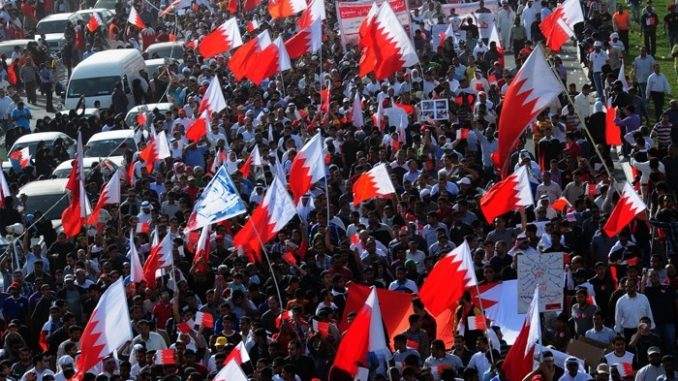
By Adam Smith
Two men who were facing death by firing squad have been saved as questions were raised over the UK’s involvement in the case, metro.co.uk has learned. Mohammed Ramadhan and Husain Moosa were both prosecuted for killing police officers but their convictions have now been quashed. Moosa was arrested in February 21, 2014, after he had attended a pro-democracy march.
Meanwhile, Ramadhan who was a police officer at Bahrain International Airport but attended peaceful marches was arrested for killing a fellow policeman on February 14, 2014. At the time UK taxpayers cash had been spent improving the desert kingdom’s justice system, training officials and implementing procedures to prevent torture.
However, Moosa was left hanging from a ceiling at Jau prison, where UK instructors trained guards, for three days and beaten with batons and confessed under duress. He was also told that his ‘real crime’ was attending pro-democracy demonstrations. Ramadhan was blindfolded, stripped naked, beaten with iron rods and was threatened with rape against his family. Again a confession was extracted through torture and was the only evidence used against him.
A third prisoner, Maher Al-Khabbaz was beaten with fists, metal wires and sticks, forced to stand for days and forbidden to eat or pray. He was tortured so severely he was transferred to military hospital and signed false confession at gunpoint. He is still on death row.
Since 2012 more than £5million of British money has been used to help Bahrain’s justice system. Human rights group Reprieve say the UK Government could bare some responsibility as a result of its ‘technical assistance’. Deputy director Harriet McCulloch told metro.co.uk: ‘While we welcome the quashing of these sentences, Mohamed and Husain could be sentenced to death all over again if their new trial is anything like the farce of their first, so the British Government should commit to attending each and every hearing as it has done in many other cases.’
Bahrain Institute for Rights and Democracy’s director of advocacy, Sayed Ahmed Alwadaei, added: ‘As victims of Bahrain’s failed criminal justice system, Mohammed Ramadan and Husain Moosa have suffered enough. ‘They were subjected to horrific acts of torture and then a wholly unfair trial, facilitated by ineffective Bahraini oversight bodies which receive UK-funded training. Only effective international monitoring, led by the British Government, can ensure their retrials are fair.’
A Foreign and Commonwealth Office spokesperson said today: ‘We welcome these retrials following the recommendation of the Special Investigations Unit and will continue to monitor the cases closely. ‘We regularly attend court hearings in Bahrain and raise any concerns at a senior level with the Government of Bahrain.’ Hammersmith MP Andy Slaughter has been demanding answers from the Foreign Office about the UK’s involvement in Bahrain’s criminal justice system.
He said: ‘Much of the Foreign and Commonwealth Office’s assistance programme has gone to funding training for elements of Bahrain’s criminal justice system, from the police and prison guards to the Public Prosecution’s Special Investigation Unit and the Ombudsman of the Ministry of Interior. ‘During this training or after it, these Bahraini institutions were implicated in serious human rights violations against death row inmates.
‘The FCO has refused to release any of its human rights assessments for its work in Bahrain.’ He added: ‘In 2017 Bahrain broke a seven-year moratorium on capital punishment when it executed Abbas al-Samea, Sami Mushaima and Ali al-Singace in secret by firing squad.’ ‘According to Reprieve all three were convicted based on false confessions extracted through torture.’
Bahrain was a protectorate of the UK before declaring independence in 1971. During the 2011 Arab spring there were pro-democracy protests in Bahrain which resulted in a clampdown by troops loyal to the ruling Royal family. Following widespread criticism of the Bahrain regime and the draconian punishments given to protesters the UK agreed to help the country implement ‘progressive reforms’.
Source metro.co.uk





Be the first to comment